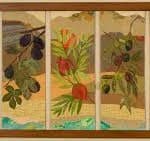Moshe Kempinski
The Torah portion of Eikev begins with the following verse :
And it will be, because ( EIKEV) you will heed these ordinances and keep them and perform, that the Lord, your God, will keep for you the covenant and the kindness that He swore to your forefathers. 13. And He will love you and bless you and multiply you; He will bless the fruit of your womb and the fruit of your soil, your grain, your wine, and your oil, the offspring of your cattle and the choice of your flocks, in the land which He swore to your forefathers to give you.( Deuteronomy 7: 12-13)
The Hebrew word used for “because” Eikev is an unusual choice of words as there are so many other words that are a clearer enunciation of the thought
Our sages focus on the use of the word eikev and all point to the fact that word Eikev is spelled in the same way as the word for the “heel”
Rashi upon relating it to the heel that people step on and alludes that this is to teach us that we are to be careful of all of Hashem’s commandments even those that seem unimportant and are usually stepped on as insignificant.
The Ramban, explains that the true understanding of the significance of HaShem’s commandments is realized only at the end of the journey at the “Eikev” . The Ohr HaChaim continues with the thought and explains that we can only arrive at complete understanding and completion at the end of the journey.
The Tzemach Tzedek (the 3rd Chabad Rebbe) sees it as a reference to Ikvata d’meshichah, the generation of “the heels or footsteps of the Mashiach” It is then ,that all will become clear and understood
Others understand that Eikev alludes to the simple fact that throughout exile we will be at the heel and object of oppression of Esau or Edom which is Rome until the end. This connects to the verse in Genesis “After this, his brother came out, with his hand grasping Esau’s heel ( eikev)l; so he was named Yaacov. (Genesis 25:26 )
All these thoughts combine to relate the message that in spite of the oppression of the exiles, our commitment and adherence to even the smallest of G-d’s wishes and commandments will be the way of life that will bring us whole , though bruised, until the final days.
Therefore Moshe tells them to have no fear and suggests a clear signpost for them to recognize.
We continue to read in the Torah portion of Eikev the following description of the land of Israel;
“A land of wheat, and barley, and vines, and fig trees, and pomegranates; a land of olive oil and honey (Deut. 8:8).”
The Land of Israel and its interconnected history with the people of Israel seems to be continuously intertwined with its produce and fruit .
When Jacob determines to send a gift of appeasement to the mysterious viceroy in Egypt , we read how Jacob with the prophetic aspect of his destiny based name of “Israel” decides to send fruit ;
“So Israel, their father, said to them, If so, then do this: take some of the choice products of the land in your vessels, a little balm and a little honey, wax and lotus, pistachios and almonds.”( Genesis 43:11)
When Moshe sends spies into the land of Israel we read;
“And they came unto the valley of Eshkol, and cut down from thence a branch with one cluster of grapes, and they bore it upon a pole between two; they took also of the pomegranates, and of the figs.”( Numbers 23:23)
When they returned we read them declaring the following.
” And they told him, and said: ‘We came unto the land whither thou sentest us, and surely it floweth with milk and honey; and this is the fruit of it.” (ibid: 27) Yet they failed to read the message of these fruits and rejected the land and entered into 40 years of wilderness and exile.
Then, when the people were to finally succeed in entering the land , the farmers are commanded to bring their first fruits to the Temple . After a year of toiling, planting, watering, tending, and caring for the produce man has grown, the farmer enters his field. He sees the first ripening fruit of one of the seven species and he ties a band over this fruit and declares “This is for Bikkurim (the ceremony of first fruits)”. Later, when it ripens, he places it in a basket.
These baskets were then brought to the Temple in a festive procession. As the procession would walk through the streets of Jerusalem, all the workmen, scholars and even the king would stop what they are doing and stand in honor of these farmers.
The Torah commentator Bartenura raises the following question. According to another Jewish law, it is obligatory to stand in honor of a Torah scholar when he passes .This is done not so much to honor the scholar as it is to honor the Torah that he represents. Yet that same Jewish law states that craftsmen do not have to stop their work to stand up for such a scholar as this would interrupt their work and livelihood.
“Why” ,asks the Bartenura,” is this not the case regarding these farmers bringing the first fruits ?”
The reason seems to be that these farmers, in this situation, during these festive times act as high priests. They are the tools of G-d’s revelation within nature. This would be true anywhere in the world. Yet this is especially true in the land wherein Heaven touches the earth.
In such a place the very fruits carry a Divine message. They declare the return of the experience of Kvod haShem (G-d’s Glory), symbolized by the fruits and blossoms of the land.
As the prophet Ezekiel describes the final return of the people from Exile in the following way; “But you, O mountains of Israel, will produce branches and fruit for my people Israel, for they will soon come home.”(Ezekiel 36:8) . Every fruit, every tree, every flower is a testament to the fulfillment of HaShem’s promises.
As a result the renowned sage, Rashi declares the Talmudic understanding of the verse in Ezekiel regarding the fruits of the land (Rabbi Abba Sanhedrin 98a) ;
“”When Eretz Yisrael gives forth its fruit in abundance the end will be near, and there is no clearer sign of the End of Days.”
That time has already arrived.
Achai veAchotai- my brothers and sisters come and taste the fruits.

LeRefuat Yehudit bat Golda Yocheved
